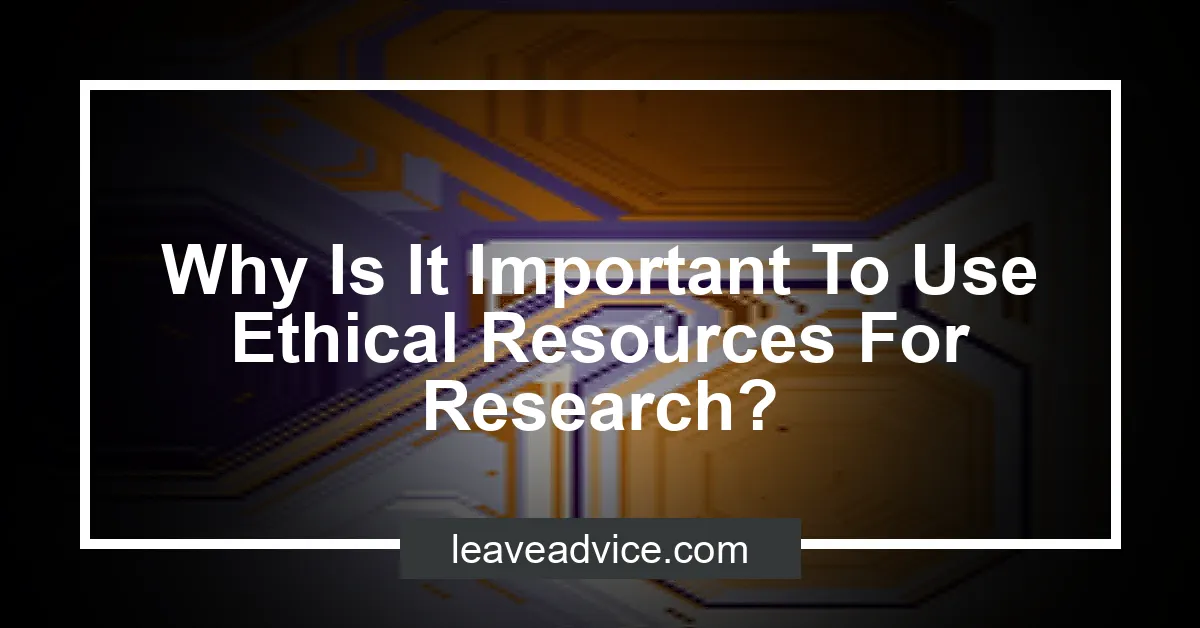Why Is It Important To Use Ethical Resources For Research?


Ethical resources are those that are sourced, used, and managed in a responsible and sustainable manner, taking into consideration the impact on society, the environment, and future generations.
The purpose of this article is to highlight the importance of using ethical resources, and to provide guidelines and resources for individuals and organizations to make ethical choices in their practices and decision-making.
Check out this Youtube video: “Research Ethics – Ethical Practice (part 3 of 3) – YouTube” to understand why it is important to use ethical resources in academic and research settings.
The Importance of Ethical Resources
Ensuring accuracy and reliability of research
Ethical resources ensure the accuracy and reliability of research by promoting transparent and unbiased data collection methods. This integrity in the research process enhances the credibility and trustworthiness of the findings, leading to informed decision-making based on accurate information.
Maintaining integrity and credibility
Maintaining integrity and credibility is vital in upholding ethical standards in research. Ethical resources help in ensuring that researchers and professionals adhere to ethical guidelines, thereby maintaining the integrity of their work and preserving their credibility within academic and professional circles.
Upholding ethical standards in academia and professional fields
Upholding ethical standards in academia and professional fields is crucial for fostering a culture of trust, respect, and responsibility. Ethical resources provide the necessary framework to guide individuals in making ethical decisions, contributing to a conducive and reputable academic and professional environment.
Ethical Research Practices
Obtaining consent from participants
Obtaining consent from participants is crucial in ethical research. It involves providing a clear explanation of the study and ensuring that participants comprehend the details.
This is often achieved through a written consent form or information sheet, minimizing coercion or undue influence. Informed consent is vital as it ensures that individuals voluntarily confirm their willingness to participate in the research after being fully informed.
Ensuring privacy and confidentiality
Maintaining privacy and confidentiality is essential in ethical research. This can be achieved through secure data collection and storage practices, ensuring that all members of the study team uphold confidentiality.
Methods for maintaining data confidentiality include using participant identifiers and storing data securely to prevent unauthorized access.
Avoiding plagiarism and citing sources properly
Avoiding plagiarism is a critical aspect of ethical research. This involves giving credit to the original authors by properly documenting and citing sources.
It’s essential to provide references for direct quotes and properly paraphrased content to acknowledge the sources and avoid the unethical practice of plagiarism.
| Key Practices for Ethical Research |
|---|
| Obtaining Informed Consent |
| Ensuring Privacy and Confidentiality |
| Proper Citation and Avoiding Plagiarism |
These practices form the cornerstone of conducting ethical research, ensuring the protection of participants, maintaining integrity, and upholding the standards of academic and scientific integrity.
The Impact of Unethical Research
Unethical research practices undermine the validity of findings, tainting the integrity of scientific discoveries and advancements. When researchers engage in misconduct like data fabrication or falsification, it creates a cloud of doubt around the accuracy and reliability of the results, ultimately hindering the progress of knowledge and innovation.
Damaging the reputation of researchers and institutions is a dire consequence of unethical research practices. It erodes trust in the scientific community, leading to skepticism and skepticism and skepticism.
It tarnishes the credibility of not only individual researchers but also entire institutions, impacting future collaborations and funding opportunities.
Causing harm to participants and stakeholders is a grave repercussion of unethical research. Participants and stakeholders place their trust in researchers and institutions, expecting ethical treatment and valid results.
When this trust is violated through unethical practices, it can lead to physical, emotional, and reputational harm, impacting not only the individuals involved but also the broader community’s perception of research ethics and integrity.
| Unethical Research Practices | Impact |
|---|---|
| Data fabrication | Undermines the validity of findings |
| Falsification of results | Damages reputation of researchers & institutions |
| Violation of ethical standards | Causes harm to participants & stakeholders |
The importance of using ethical resources cannot be overstated. By upholding moral and professional standards in research, we ensure the veracity of our findings, protect the integrity of researchers and institutions, and safeguard the well-being of participants and stakeholders.
Remember, folks, it’s vital to adhere to ethical research practices to maintain the integrity of the scientific community and ensure the trust and well-being of all involved.
Ethics in Data Collection
Using accurate and unbiased data
It’s crucial to use accurate and unbiased data because it ensures the credibility and reliability of any research or study. By gathering data from trustworthy and reputable sources, we can eliminate the risk of drawing incorrect conclusions or making flawed decisions.
For instance, when conducting market research, utilizing data from reputable industry reports and government databases ensures the accuracy of the findings.
Avoiding the manipulation of research outcomes
Ethical research demands the prevention of manipulating research outcomes, as this could mislead or deceive people who rely on the findings. By maintaining transparency and integrity in the research process, we uphold the value of truth and credibility.
An example of this is avoiding the omission of negative results or altering data to fit a predetermined hypothesis, as it distorts the overall understanding of the truth.
Respecting the rights and autonomy of research subjects
Respecting the rights and autonomy of research subjects is essential as it upholds their dignity and safeguards their well-being. It involves obtaining informed consent, protecting privacy, and considering cultural sensitivities.
For instance, in healthcare research, respecting patients’ autonomy ensures that they have control over their participation and are fully aware of the implications, promoting transparency and ethical conduct.
Institutional Guidelines and Regulations
Following ethical codes and standards
Adhering to ethical codes and standards is crucial for maintaining integrity and trust in research. It ensures that researchers conduct themselves with honesty, transparency, and fairness, ultimately upholding the dignity and rights of individuals involved in the research process.
Seeking institutional review board approval
Institutional review board (IRB) approval is essential as it serves as a safeguard for participants’ welfare and rights. Seeking IRB approval demonstrates a commitment to ethical research practices and ensures that studies are conducted in compliance with institutional policies, state laws, and federal regulations.
Complying with legal and ethical requirements
Compliance with legal and ethical requirements is imperative to uphold the highest standards of research conduct. It involves rigorously adhering to guidelines for authorship, copyright and patenting policies, data sharing policies, and confidentiality to protect the rights and well-being of research subjects.
Ensuring Ethical Publication Practices
Peer review and editorial standards
A successful peer review is crucial in maintaining ethical publication practices. It ensures thorough evaluation of research articles by experts in the field, guaranteeing accuracy and credibility.
Implementing best practices, such as providing comprehensive feedback on the manuscript’s main claims and impact, is essential for upholding quality editorial standards.
Transparency in reporting methods and findings
Transparency in reporting methods and findings is fundamental for ethical publication. It allows for the reproducibility of studies by other researchers, facilitating proper interpretation and dissemination of results.
Adhering to transparency standards, including data availability, analytic methods, and citation standards, enhances the integrity and reliability of research reporting.
Acknowledging and avoiding conflicts of interest
Acknowledging and avoiding conflicts of interest is paramount to maintaining ethical publication practices. Authors must disclose any financial, career, political, or social interests that could influence their professional judgment.
Implementing proactive strategies and declaration requirements for conflicts of interest ensures impartiality and truthfulness in academic publications.
Ethical Considerations in Behavioral Research
Protecting vulnerable populations
Protecting vulnerable populations in behavioral research is crucial to ensure ethical practices. This involves safeguarding individuals who may be susceptible to harm or exploitation, such as children, pregnant women, and those with limited cognitive abilities.
Measures include securing informed consent, establishing stringent confidentiality protocols, and providing additional protections tailored to the specific vulnerabilities of the participants.
Minimizing potential harm to participants
Minimizing potential harm to participants is paramount in ethical behavioral research. This requires a comprehensive assessment of potential risks associated with the research and the implementation of measures to mitigate these risks.
It also involves providing clear information to participants, obtaining their informed consent, and continually monitoring and responding to any issues that may arise during the research process.
Balancing risks and benefits
Balancing risks and benefits in behavioral research entails evaluating the potential harm that participants may encounter against the benefits that the research may yield. This evaluation must be conducted transparently and with the participants’ best interests in mind.
Researchers must ensure that the benefits of the research justify any potential risks, and that participants are fully informed about both the risks and benefits before deciding to take part.
Ethical Considerations in Scientific Research
Ensuring the welfare of research subjects
It’s crucial to prioritize the welfare of research subjects to maintain the integrity of scientific research. Ethical resources ensure that participants are treated with respect and dignity, protecting them from exploitation or harm.
Adhering to ethical standards also builds trust with the broader community, encouraging more participation and collaboration in future research endeavors. Utilizing ethical resources safeguards the well-being of research subjects, fostering a culture of accountability and transparency within the scientific community.
Using humane and responsible animal testing practices
Employing humane and responsible animal testing practices is imperative for ethical scientific research. It upholds the moral obligation to minimize the suffering of living beings involved in research activities.
By adhering to ethical guidelines, researchers demonstrate their commitment to balancing scientific advancement with ethical responsibility. Ethical resources enable the implementation of protocols that prioritize the welfare of animals, reflecting a compassionate and conscientious approach to scientific inquiry.
Reporting research findings accurately and honestly
Ensuring the accurate and honest reporting of research findings is a cornerstone of ethical scientific research. Utilizing ethical resources promotes transparency and reliability in disseminating research outcomes.
By accurately reporting findings, researchers contribute to the accumulation of credible knowledge, enhancing the overall integrity of the scientific community. Honest reporting also fosters trust and confidence among stakeholders, reinforcing the ethical foundation of scientific research.
| Aspect | Importance |
|---|---|
| Well-being of research subjects | Safeguards dignity and fosters trust |
| Animal testing practices | Demonstrates compassion and ethical responsibility |
| Reporting research findings | Enhances reliability and credibility |
Ethical considerations in scientific research are vital for upholding integrity, fostering trust, and ensuring the responsible advancement of knowledge and innovation.
Remember, ethical resources are the bedrock of scientific integrity. So, let’s make science ethical again!
Ethical Considerations in Social and Cultural Research
Respecting diverse perspectives and cultural nuances
Respecting diverse perspectives and cultural nuances is crucial in social and cultural research to ensure that the findings accurately represent the varied experiences and beliefs within a community. It’s important to recognize and honor the differences in cultural norms, values, and traditions to avoid imposing one’s own biases on the research.
For example, when conducting a study in a multicultural community, researchers should actively seek input from individuals of different cultural backgrounds to gain a comprehensive understanding of the issues being studied and incorporate these diverse perspectives into the research process.
Engaging in respectful and ethical interactions with communities
Engaging in respectful and ethical interactions with communities is essential to build trust and establish open communication channels. Respectful interactions can be demonstrated by actively listening to the community members, valuing their input, and involving them in the research process.
For instance, researchers should strive to create partnerships with community leaders and organizations to ensure that the research aligns with the community’s values and needs. By fostering respectful interactions, researchers can create an environment where community members feel comfortable sharing their experiences and perspectives, leading to more meaningful and authentic research outcomes.
Avoiding exploitation and misrepresentation
Avoiding exploitation and misrepresentation is paramount in social and cultural research to uphold the dignity and rights of the individuals and communities involved. Researchers must be vigilant against any potential harm or misuse of information obtained during the research process.
For example, obtaining informed consent and ensuring confidentiality are essential steps to prevent exploitation and misrepresentation. Additionally, researchers should strive to accurately represent the data collected without distorting or sensationalizing the findings, thus avoiding misrepresentation of the community’s experiences and realities.
Promoting Ethical Research in the Digital Age
Ethical use of data and information
Ethical use of data and information is imperative in the digital age as it ensures that sensitive information is handled with utmost respect, protecting individuals’ privacy and rights. For instance, companies must obtain explicit consent before using personal data for research, respecting individuals’ autonomy and privacy.
An example of this is the implementation of strict data privacy policies in tech companies, ensuring that user data is ethically used and protected.
Addressing cybersecurity and privacy concerns
Addressing cybersecurity and privacy concerns is vital to maintain trust and protect sensitive data from unauthorized access or breaches. For instance, implementing robust encryption measures and multi-factor authentication protocols can safeguard digital research data from malicious cyber threats.
It’s like ensuring a secure vault for valuable information, preventing unauthorized access and protecting it from potential breaches.
Ensuring transparency in digital research practices
Ensuring transparency in digital research practices is crucial as it fosters accountability and trust. For instance, providing clear and accessible documentation about data collection methods and research procedures promotes transparency, enabling stakeholders to understand how their data is being used.
It’s akin to maintaining an open book policy, ensuring that all individuals involved in the research process are informed and have a clear understanding of how their data is utilized.
Educating Researchers on Ethical Practices
Providing training and resources for ethical research
To ensure ethical research practices, providing comprehensive training is crucial. Institutions can collaborate with established programs such as the Collaborative Institutional Training Initiative (CITI), offering courses in responsible conduct of research for both students and postdoctoral scholars.
These courses cover areas like human research ethics, conflicts of interest, and research integrity, equipping researchers with the essential knowledge to uphold ethical standards.
Fostering a culture of integrity and responsibility
Creating a culture of integrity within research teams and institutions is paramount. This can be achieved by defining and communicating clear expectations for ethical conduct.
Offering actionable strategies to promote and sustain ethical research conduct fosters an environment where research integrity becomes a shared objective. By aligning institutional approaches with core values and guiding norms, research organizations can further reinforce a culture of research integrity.
Holding individuals and institutions accountable for ethical breaches
In addressing ethical breaches, accountability plays a pivotal role. Researchers, institutions, and Research Ethics Boards (REBs) must identify and address conflicts of interest.
This ensures that individuals and organizations are held responsible for their actions and are required to explain them to others. By embracing standards of excellence, trustworthiness, and lawfulness, institutions create an environment that promotes responsible conduct and accountability.
Ethical Leadership and Mentorship
Leading by example in ethical research practices
Leading by example in ethical research practices is crucial for setting the tone and standard for ethical behavior within an organization. When leaders demonstrate a commitment to ethical research, they inspire and influence others to follow suit.
This not only fosters a culture of integrity and trust but also ensures that research processes and outcomes are ethical and reliable.
Mentoring researchers in ethical decision-making
Mentoring researchers in ethical decision-making is essential for instilling a strong ethical compass in the next generation of researchers. By providing guidance and support, mentors can help researchers navigate complex ethical dilemmas, uphold moral standards, and make ethically sound decisions throughout their research endeavors.
This ensures that ethical considerations are deeply embedded in the research process.
Creating a supportive and ethical research environment
Creating a supportive and ethical research environment involves fostering a culture where ethical principles are upheld, valued, and integrated into every aspect of the research ecosystem. This entails establishing clear ethical guidelines, promoting open dialogue about ethical challenges, and providing resources and support to ensure that researchers feel empowered to maintain ethical standards.
Such an environment not only safeguards the integrity of research but also nurtures a community committed to ethical conduct.
Ethical Challenges and Dilemmas
Balancing competing ethical considerations
It’s like juggling different balls in the air, but these balls are actually ethical considerations. Business leaders must find the right balance between profitability and ethical responsibilities.
This means making tough decisions while considering the impact on employees, customers, and the community.
Addressing conflicts of interest
Conflicts of interest are like wild weeds in a garden – if you don’t address them, they’ll take over. Leaders must proactively identify and address potential conflicts of interest to maintain transparency and trust.
This involves implementing clear policies and processes for disclosure and resolution.
Handling ethical gray areas and uncertainties
Navigating ethical gray areas is like walking through a foggy forest – you can’t always see clearly. Business leaders must establish guidelines and training programs to help employees recognize and address ethical gray areas.
This includes promoting open communication and providing support for ethical decision-making.
Ethical Decision-Making Framework
Utilizing ethical decision-making models
It is important to use ethical decision-making models because they provide a structured approach to evaluating and resolving ethical dilemmas in the workplace. These models offer a systematic process for considering various perspectives, identifying potential consequences, and arriving at ethical solutions.
With the use of such models, organizations can ensure that their decision-making processes are fair, transparent, and aligned with ethical principles, thereby promoting trust and integrity within the workplace.
Seeking ethical advice and consultation
Seeking ethical advice and consultation is crucial as it allows organizations to tap into expertise and diverse viewpoints when faced with complex ethical challenges. By consulting with ethics professionals or experts in the field, organizations can gain valuable insights and guidance to navigate ethical dilemmas effectively.
This collaborative approach not only enhances the quality of decision-making but also demonstrates a commitment to upholding ethical standards and values within the organization.
Applying ethical principles to research dilemmas
Applying ethical principles to research dilemmas is essential for safeguarding the rights and well-being of research participants. It ensures that research activities are conducted with integrity, respect, and accountability.
By adhering to ethical principles such as voluntary participation, informed consent, and confidentiality, researchers uphold the ethical integrity of their work and contribute to the advancement of knowledge in a responsible and ethical manner.
Collaboration and Networking for Ethical Research
Promoting ethical collaboration and partnerships
It’s fantastic to see so many researchers and organizations coming together to promote ethical collaboration and partnerships. By engaging in this collective effort, we can ensure that research endeavors uphold the highest ethical standards while achieving impactful outcomes.
Building networks for ethical discussions and support
Building networks for ethical discussions and support is vital in fostering a culture of transparency and integrity in research. Through open conversations and support systems, researchers can navigate ethical dilemmas effectively, share experiences, and collectively work towards ethical best practices.
Sharing best practices and resources for ethical research
Sharing best practices and resources for ethical research is a game-changer. It allows researchers to benefit from each other’s experiences, access valuable tools, and stay updated on the latest ethical guidelines.
This collaborative approach ultimately raises the bar for ethical research across the board.
| Benefits of Ethical Collaboration and Networking |
|---|
| 1. Enhanced Trust and Credibility |
| 2. Access to Diverse Perspectives |
| 3. Accelerated Adoption of Ethical Standards |
| 4. Heightened Accountability and Responsibility |
With ethical collaboration and networking at the forefront, the research landscape stands to gain immensely, fostering a community driven by integrity, responsibility, and continuous improvement.
Recommended Amazon Products for Ethical Research Practices
Here’s a curated list of products that can help you ensure ethical and responsible research practices with ease. These recommendations are based on the importance of using ethical resources in academia and professional fields.
Quality Research Ethics: A Reflective Practice


This book provides comprehensive guidance on ethical research practices, covering topics such as obtaining consent, avoiding plagiarism, and promoting integrity. It offers practical insights and reflective exercises to enhance ethical decision-making.
Pros and Cons of Quality Research Ethics: A Reflective Practice
| Pros | Cons |
|---|---|
| Comprehensive guide | Limited to theoretical concepts |
| Reflective exercises | Lack of specific case studies |
| Practical insights | Overwhelming for beginners |
NVivo Qualitative Data Analysis Software


NVivo is a powerful software tool for analyzing qualitative data while upholding ethical standards. It assists in managing and coding research data with transparency and accuracy, ensuring reliable outcomes.
Pros and Cons of NVivo Qualitative Data Analysis Software
| Pros | Cons |
|---|---|
| Robust research analysis | Learning curve for beginners |
| Transparent data management | Subscription-based pricing |
| Ethical data coding features | Requires computer literacy |
Canon EOS Rebel T7 DSLR Camera


For ethical data collection, the Canon EOS Rebel T7 DSLR Camera captures high-quality images to depict research subjects and settings ethically. Its superior image clarity upholds the reliability of research visuals.
Pros and Cons of Canon EOS Rebel T7 DSLR Camera
| Pros | Cons |
|---|---|
| High-quality image capture | Higher price point |
| User-friendly interface | Additional accessories may be needed |
| Reliable brand reputation | Learning curve for advanced features |
Serenilite Stress Ball & Hand Therapy Gel Squeeze Ball


Promoting ethical consideration for the welfare of research subjects, this stress ball supports participants’ mental and emotional well-being during studies. It encourages respectful and compassionate treatment of subjects.
Pros and Cons of Serenilite Stress Ball & Hand Therapy Gel Squeeze Ball
| Pros | Cons |
|---|---|
| Promotes emotional well-being | Limited to specific use case |
| Versatile for various hand exercises | Not directly related to research data |
| Durable material | Not applicable for all research projects |
Dell UltraSharp U2719D LED Monitor


Ensuring ethical research in digital practices, this LED monitor offers accurate and reliable display for visual research analyses. Its high resolution enhances data visibility and transparency.
Pros and Cons of Dell UltraSharp U2719D LED Monitor
| Pros | Cons |
|---|---|
| High-resolution display | Premium pricing |
| Accurate color representation | Limited to digital research applications |
| Reliable brand quality | Larger size may not be suitable for all workspaces |
Top Recommended Product for Ethical Research Practices
If you’re looking for the best solution to ensure ethical research practices, we highly recommend Quality Research Ethics: A Reflective Practice. This comprehensive guide provides practical insights and reflective exercises to enhance ethical decision-making, making it an essential resource for researchers committed to upholding ethical standards.


Ready to improve your ethical research practices? Check out Quality Research Ethics: A Reflective Practice today for the best results!


Conclusion
It is important to use ethical resources to ensure that the information or materials used are obtained in a responsible and morally upright manner. By using ethical resources, individuals and organizations can avoid contributing to harmful practices such as exploitation, injustice, or environmental damage.
Moreover, utilizing ethical resources helps to build trust and credibility with stakeholders, as it demonstrates a commitment to upholding ethical standards and values. This can enhance the reputation of the individual or organization and lead to better relationships with customers, partners, and the community.
The use of ethical resources aligns with societal expectations and legal requirements, promoting a fair and equitable society while also contributing to sustainable development. By prioritizing ethical considerations in resourcing, individuals and organizations can make a positive impact on the world around them and contribute to a more responsible and ethical global community.




